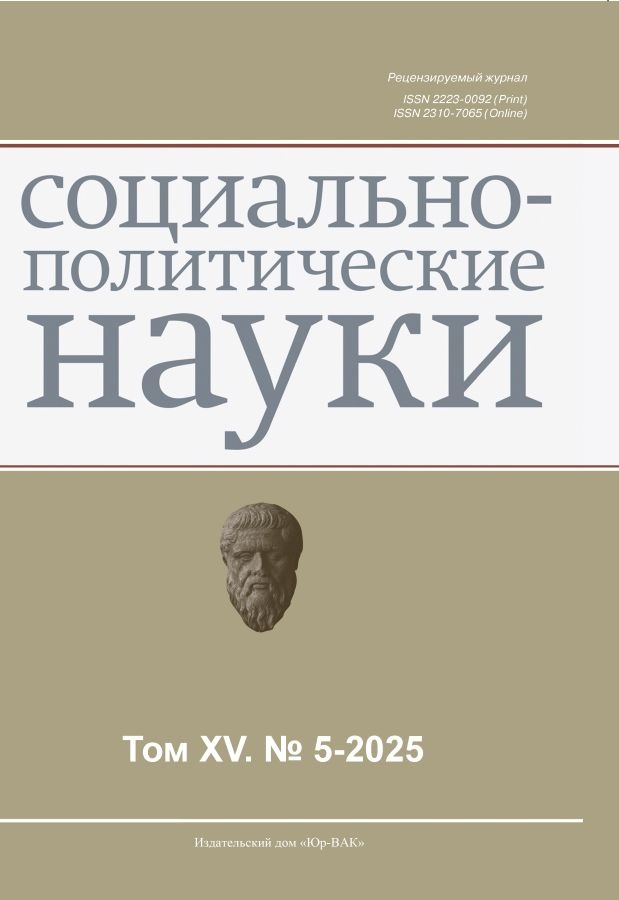The Hero’s Face in Russian Media: Methodology and Results of the Study
- Authors: Gabrielyan O.A.1, Garbuzov D.V.1
-
Affiliations:
- V.I. Vernadsky Crimean Federal University
- Issue: Vol 15, No 5 (2025)
- Pages: 269-277
- Section: Philosophical anthropology, philosophy of culture
- URL: https://journals.eco-vector.com/2223-0092/article/view/696816
- DOI: https://doi.org/10.33693/2223-0092-2025-15-5-269-277
- EDN: https://elibrary.ru/DQORQV
- ID: 696816
Cite item
Abstract
The purpose of this article is to explore the pressing issue of the formation and reproduction of the hero’s image in the media in contemporary Russian society. This will allow us to identify and describe the image of the modern hero and the challenges that arise in its development. This paper emphasizes research methodology. This issue serves as an indicator of society’s vital potential: are there ideals and values that society and its members are willing to defend as existential? Global media actively disseminate popular culture models that deheroization of everyday life and significantly transform traditional values. Results. The hero appears in the public consciousness in a variety of forms. On a theoretical level, this complicates their study, and on a practical level, the formation of a generally accepted image in society is a difficult task. Defining one’s own identity is closely linked to the image of a hero and an understanding of the meaning of heroism. However, self-identification in the context of the blurred new sociality proves to be a complex task. The image of the hero is being distorted in various social groups, where idols, opinion leaders, media personalities, million-follower bloggers, politicians, and the like are beginning to dominate. In modern society, informational (virtual) reality is replacing the real one. Its conventional values, ethical norms invented for temporary consumption, are transferred to reality – to social relations between people. A critical contradiction arises between the world created in informational and virtual space and the world of everyday human existence. Research conducted to monitor the image of the hero in Russian media indicates that the image of the traditional cultural hero (and the hero in general) is underrepresented on social networks and in consumed information products (particularly video and audio content). This is clearly explained by the fact that the emergence of a consumer society in Russia has led to the erosion of traditional values and the infusion into public consciousness of heroic myths alien to the civilizational code of the peoples of Russia through new media, the film industry, advertising, political, and other socio-humanitarian technologies. However, these same tools can be used no less effectively to develop a hero archetype consistent with traditional Russian values. This archetype must be naturally integrated into Russia’s social imaginary landscape, forming an indigenous ecosystem of the heroic.
Full Text
About the authors
Oleg A. Gabrielyan
V.I. Vernadsky Crimean Federal University
Author for correspondence.
Email: gabroleg@mail.ru
ORCID iD: 0000-0003-0302-0229
SPIN-code: 7531-0063
Dr. Sci. (Philos.), Professor, Professor, Department of Philosophy
Russian Federation, SimferopolDmitry V. Garbuzov
V.I. Vernadsky Crimean Federal University
Email: buendia@bk.ru
ORCID iD: 0000-0002-8321-8229
SPIN-code: 1745-9396
Dr. Sci. (Philos.), Associate Professor, Professor, Department of Philosophy
Russian Federation, SimferopolReferences
- Gabrielyan O.A., Garbuzov D.V. Mythological hero as a cultural institution: Origins and modernity. Part 1. Origins and meaning of the heroic myth. In: Scientific notes of the V.I. Vernadsky Crimean Federal University. Philosophy. Political Science. Cultural Studies. 2025. Vol. 11. No. 2. Pp. 81–89.
- Gabrielyan O.A. Sociocultural technologies for the formation of civic consciousness: Problems of efficiency. In: Civic-patriotic education of youth – a matter of national security. Proceedings of the All-Russian National Scientific and Practical Conference (Rostov-on-Don, Taganrog, Stavropol, Simferopol, April 25–26, 2018). Rostov-on-Don. 2018. Vol. 2. Pp. 21–24.
- Gabrielyan O.A. Sociocultural design as a modern socio-humanitarian technology. In: Days of science of V.I. Vernadsky Crimean Federal University. Collection of abstracts of participants of the II scientific conference of faculty, graduate students, students and young scientists. Simferopol, 2016. P. 783.
- Ivanova E.V. Mythological meaning-formation: The image of a cultural hero. Abstract of dis. ... of Dr. Sci. (Philos.). Yekaterinburg. 2005.
- Krivoshchekova G.A. Heroes and heroism in the cultural and historical existence of the peoples of Europe and Russia. Abstract of dis. ... of Cand. Sci. (Philos.). Tyumen, 2003.
- New imperial history of Northern Eurasia. Part 1: Competing projects of self-organization: 7–17th centuries. I. Gerasimov (ed.). Kazan, 2017. P. 10.
- Seredinskaya L.A. Social ontology of heroism. Abstract of dis. ... of Cand. Sci. (Philos.). Ulan-Ude, 2012.
- Smirnov S.Yu. Transformation of the image of the hero in the consciousness of Russian society (socio-philosophical analysis). Abstract of dis. ... of Cand. Sci. (Philos.). Moscow, 2011.
- Sorokin P.A. Social and cultural dynamics: Studies of changes in large systems of art, truth, ethics, law, and social relations. St. Petersburg, 2000. 1054 p.
- Suravneva I.M. Heroism as a social phenomenon. Abstract of dis. ... of Cand. Sci. (Philos.). Tver, 2006.
- Trofimova A.V. Feat as a phenomenon of Russian culture. Abstract of dis. ... of Cand. Sci. (Philos.). Nizhny Novgorod, 2008.
- Shcherbinina N.G. Heroic myth in the construction of political reality in Russia. Abstract of dis. ... of Cand. Sci. (Polit.). Moscow, 2008.
- Efroimson V.P. Genealogy of altruism (Ethics from the standpoint of human evolutionary genetics). New World. 1971. No. 10. Pp. 193–213. (In Rus.)
Supplementary files









